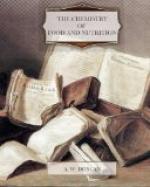the cause of the bad health of such persons.
There is no reason to think the proteid insufficient,
although some persons have said as much. We have
no particulars of the German vegetarians, but the
calories appear satisfactory. In the poor German
labourer’s family the calories are too low.
In Dr. T.R. Allinson’s experiment on a
wheatmeal dietary, it will not do to assume that less
than 82 grammes of proteid would have been insufficient.
It is probable that a smaller quantity of proteid
would have been enough if the fat and carbohydrates
had been increased. The calories are below the
usual standard. In the succeeding example the
calories are considerably higher, being not far from
the usual standard, yet 54 grammes of proteid sufficed.
It is a common error to place an undue value on the
proteids to the extent of overlooking the other constituents.
Dr. Alexander Haig in “Diet and Food,”
p. 8, cites the case of a boy aged 10, fed on 2-1/4
pints of milk per day. The boy lost weight, and
Dr. Haig is of opinion that the quantity of milk was
very deficient in proteid; more than twice as much
being required. 2-1/4 pints of milk contain about
45 grammes of proteid, whereas, according to the usual
figures (125 x 6/10) a boy of this age requires 75
g. This quantity of 45 g. is however, higher,
allowing for the boy’s age, than that in several
of the dietaries we have given in our table.
A little consideration will show that Dr. Haig has
overlooked the serious deficiency of the milk in the
other constituents, which accounts for the boy’s
loss of weight. The quantity of milk contains
only about 160 g. of total solid matter, whilst 400
g. is the necessary quantity. Milk is too rich
in proteid matter to form, with advantage, the sole
food of a human being. Human milk contains much
less in proportion to the other constituents.
The old doctrine enunciated by Justus von Liebig was
that proteid matter is the principal source of muscular
energy or strength. He afterwards discovered
and acknowledged his error, and the subject has since
been thoroughly investigated. The makers of meat
extracts and other foods, either from their own ignorance
of modern research or their wish to take advantage
of the lack of knowledge and prejudice of the public,
call proteid matter alone nourishment. The carbo-hydrates
and fats are equally entitled to be called nourishment.
Our reason for devoting so much space to the consideration
of the quantity of proteid matter required, is that
in the opinion of many eminent writers it is the crux
of vegetarianism. They have stated that it is
impossible to obtain sufficient from vegetable foods
alone, without consuming an excessive quantity of
carbo-hydrates. We will summarise the argument
as given in Kirke’s Physiology, as edited by
Morrant Baker, a standard work, and which is repeated
in Furneaux’s “Animal Physiology,”
a book which is much used in elementary science schools:
“The daily waste from the system amounts to,




